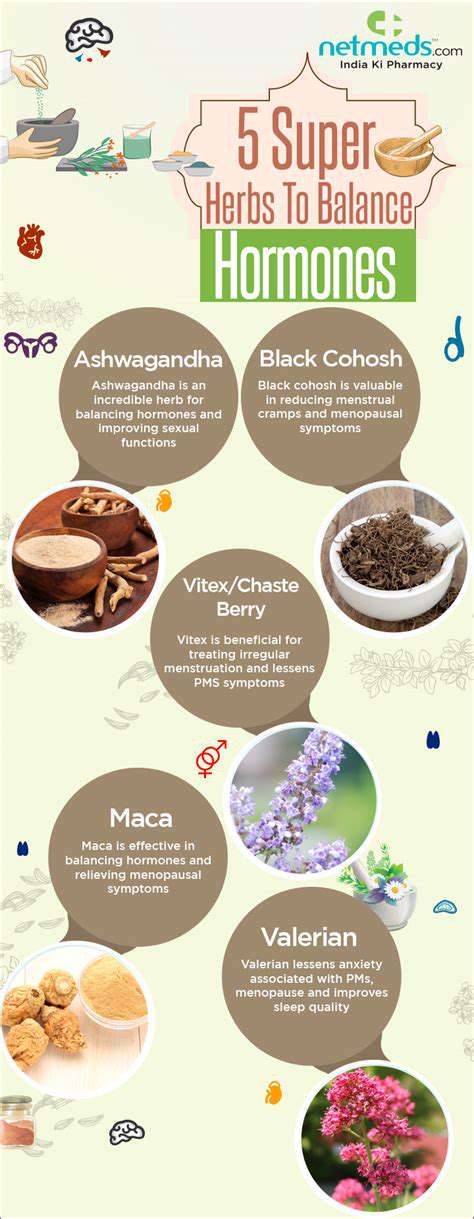Ayurvedic Herbs for Wellness: Nature's Pharmacy

Key Ayurvedic Herbs and Their Therapeutic Roles
Ashwagandha (Withania somnifera)
Ashwagandha, a prominent adaptogen in Ayurvedic medicine, is renowned for its stress-reducing and calming properties. It's often used to combat the physical and mental exhaustion that can stem from chronic stress. Studies have shown potential benefits in managing anxiety and improving sleep quality. Beyond its stress-busting capabilities, Ashwagandha may also play a role in enhancing cognitive function and bolstering the immune system, further solidifying its position as a valuable therapeutic herb in Ayurvedic wellness practices.
This powerful herb is believed to support the body's natural ability to adapt to various stressors. Its use in Ayurvedic remedies often involves incorporating it into formulations alongside other herbs, further enhancing its therapeutic effects. Ashwagandha is a key component in many Ayurvedic formulations intended to improve overall well-being and support a healthy lifestyle, making it a valuable addition to a comprehensive approach to wellness.
Turmeric (Curcuma longa)
Turmeric, with its vibrant golden hue and distinctive flavor, is a cornerstone of Ayurvedic healing. Known for its potent anti-inflammatory properties, turmeric's active compound, curcumin, has garnered significant scientific attention. Numerous studies suggest its potential to alleviate various inflammatory conditions, from arthritis to digestive issues. The herb's ability to reduce inflammation makes it an important element in maintaining a healthy body and supporting the natural healing process.
Beyond its anti-inflammatory properties, turmeric is also believed to support liver health and promote healthy digestion. Its inclusion in Ayurvedic remedies often reflects its diverse therapeutic capabilities. Many Ayurvedic practitioners recommend regular consumption of turmeric-infused foods or supplements as part of a holistic approach to wellness.
Brahmi (Bacopa monnieri)
Brahmi, a revered herb in Ayurvedic tradition, is frequently used to support cognitive function and mental clarity. It's considered a valuable aid for improving memory, focus, and concentration, potentially beneficial for individuals facing challenges with mental sharpness and focus. Research into Brahmi's effects on the brain is ongoing, but preliminary findings suggest a positive impact on cognitive performance.
Brahmi's potential benefits extend beyond cognitive enhancement. Some Ayurvedic practitioners believe it also plays a role in reducing stress and anxiety. Incorporating Brahmi into a daily routine, whether through herbal infusions or other formulations, might be a valuable addition to a holistic approach to mental well-being. Its role in supporting mental health is an area of ongoing exploration and study within Ayurvedic medicine.
Safety and Considerations

Pre-Trip Safety Checks
Before embarking on any journey, a thorough pre-trip safety check is paramount. This involves more than just confirming the vehicle's mechanical health; it encompasses a comprehensive assessment of potential risks and hazards. Ensuring all necessary safety equipment is readily accessible and in good working order is crucial. This includes checking tire pressure, fluid levels, and the functionality of lights, wipers, and signals. A proper pre-trip inspection minimizes the chance of unforeseen mechanical issues during the trip, thereby enhancing the overall safety of the journey. This proactive measure can prevent delays, accidents, and costly repairs on the road.
Furthermore, a pre-trip safety check should encompass reviewing the route, considering weather conditions, and anticipating potential road closures or traffic congestion. Knowing the expected conditions and potential challenges is essential for making informed decisions about the trip's progress. A detailed understanding of the route and any potential hazards is key to mitigating risks and ensuring a smooth and safe travel experience. This also includes verifying the availability of emergency services, such as roadside assistance or local emergency numbers, along the intended route.
Environmental Considerations
Environmental factors can significantly impact the safety and efficiency of a journey. Adverse weather conditions, such as heavy rain, snow, or fog, can drastically reduce visibility and increase the risk of accidents. Preparing for these conditions by having appropriate gear is crucial, and this includes ensuring that the vehicle is equipped for the expected weather. The impact of environmental factors on the safety of a trip cannot be overstated.
Considering the ecological impact of travel is also important. Minimizing fuel consumption through efficient driving techniques and using eco-friendly transportation options can significantly reduce the carbon footprint of travel. This is essential for preserving our environment and minimizing the negative consequences of travel on the planet. The choice to prioritize fuel efficiency and eco-friendly practices is not only beneficial for the environment but also potentially for the safety of the journey itself. For example, driving at a moderate speed in optimal conditions can help to reduce fuel consumption and improve safety.
Personal Safety Measures
Personal safety measures are essential for ensuring a secure and comfortable journey. This includes packing necessary medications, first-aid supplies, and important documents. Having a well-stocked emergency kit can be invaluable in case of unforeseen circumstances. This will ensure that you are adequately prepared for potential medical emergencies.
Staying hydrated and taking breaks during long journeys are vital for maintaining alertness and preventing fatigue. Maintaining alertness and avoiding fatigue is crucial for safe driving, and this is even more important on long journeys. This includes making sure that you have enough sleep before the trip and stopping for rest breaks at regular intervals. Recognizing the importance of these measures can significantly reduce the risk of accidents.
Furthermore, being aware of the surroundings and maintaining situational awareness is critical. This includes being mindful of other road users, traffic conditions, and potential hazards. Staying alert and informed about the environment is key to avoiding accidents and ensuring a safer journey for everyone involved. This vigilance will help you to anticipate potential issues and react accordingly.











